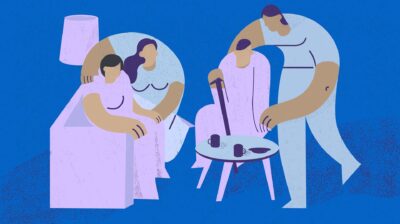Am I a young carer?
Find out if you are a young carer or young adult carer, and explore the support options are available.

Research on being a young carer shows that caregiving can take many forms and can involve a wide variety of different experiences. Young carers can take on different levels of responsibility when providing support for household members, such as siblings, parents, and grandparents. Understanding where your role fits on the broad spectrum of caregiving may help you access appropriate practical and emotional support.
In this article, you will find answers to the following questions:
What is the definition of a young carer?
Can a child be a carer?
What does a young carer do?
Do I qualify for carer’s allowance?
How can I access support as a young carer?
What is the definition of a young carer?
You are considered a “young carer” if you are under 18 and your life is affected by providing care for someone in your household. According to the Health Behaviour in School-aged Children (HSBC) study, 13.3% of 10-17 year olds provide unpaid care within their family. Young adult carers are identified as a separate group aged 18-24 years.
Some young carers and young adult carers may feel like their lives are affected a great deal, while others might consider caregiving to have much less of an impact on their day-to-day lives.
The impact of caregiving can differ depending on whether you:
- Provide support to this household member directly: In some situations, you may provide the main support to a parent or sibling who has lived experience of a physical or mental health condition and/or disability. If you are in this position, you are a primary carer within the home.
- Provide support to a household member who has caregiving responsibilities themselves: In situations where your parent or guardian provides care for your sibling, for example, you may take a supportive role for your guardian. In this role, you are a secondary carer, offering support to the primary caregiver in the home.
- Provide support to someone in another household: In some situations, you may provide care for someone who lives separately from you and your family, such as a grandparent.
These terms can help you understand differences between yourself and others your age and access specific support, but it’s also important to remember that how you choose to identify is entirely up to you.
Life as a young carer
Your life as a young carer can look very different depending on factors such as the specific care needs of the household member, and how often you may be required to provide support. Some young carers are involved in caregiving occasionally (several times per month) while other young carers provide support on a regular basis (daily, several times per week). Research shows that there is a broad spectrum of caregiving and that the impact of caregiving on your life can be both positive and negative.
Impact of caregiving
Some of the positive ways in which you might be impacted by your caregiving role include:
- Gaining important life skills, such as cooking
- Feeling a sense of connection to the person you support
- Having a greater ability to feel compassion and empathy for others
- Developing physical stamina by doing physically demanding activities
- Having a greater ability for patience and attention to detail
- Being able to plan and manage your time well
- Developing the skills to communicate with healthcare professionals and support services
Caregiving can also negatively affect your overall sense of well-being, especially when care needs arise often and require a significant amount of time and energy. You may experience:
- Not having enough time to spend time on your interests and hobbies
- Not being able to go to school or study consistently
- Not having access to information about services and supports that might assist you in your caregiving role
- Not having access to emotional support, such as counselling or psychotherapy
- Not having enough time to spend with friends
- Frequent and intense feelings of worry, resentment, stress, anxiety, and guilt
You do not have to be negatively impacted by your supportive role to be considered a young carer. However, evidence suggests that when care needs arise regularly and interfere with other aspects of your life, such as school or socialising, you may experience higher levels of stress.
Read more about the common causes of stress for young carers and possible ways of reducing this stress.
Can a child be a carer?
It’s clear from the definition of young carer that children and young people under the age of 18 are in caring roles. Different terms are sometimes used to distinguish between young people of different ages in caregiving roles. In Ireland, “young carer” generally refers to children and young people under the age of 18, while young adult carer can be used to describe young adults between the ages of 18 and 24 years.
What does a young carer do?
Caregiving can come in many different forms, including forms that you might not have thought counted as providing care.
Common types of caregiving include:
- Providing personal care: Assisting with washing, dressing, and feeding
- Helping with household tasks: Cooking, cleaning, grocery shopping, and maintaining the home
- Giving emotional support: Being there to listen, comfort, and encourage
- Offering practical support: Managing admin tasks like sorting mail, answering calls, and translating information
- Supporting medical needs: Helping with medications, scheduling and attending medical appointments, and seeking information from providers
- Providing childcare: Taking care of younger siblings
Can a child get Carer’s Allowance?
In Ireland, children under 16 are not eligible for social welfare payments for their caregiving role. To qualify for Carer’s Allowance, you must be at least 18 years old and provide full-time care for a household member and satisfy the means test.
Below is an overview of the different types of state support available for young adults in caregiving roles.
Do I qualify for carer’s allowance?
The government provides various social welfare payments for caregivers, including:
- Carer’s Allowance
- Half-rate Carer’s Allowance
- Carer’s Benefit
- Carer’s Support Grant
- Domiciliary Care Allowance
To qualify for these payments, you generally need to be at least 16 years old, with some requiring you to be over the age of 18.
Carer’s Benefit
If you are aged at least 16 and have left work or reduced your working hours due to your caregiving responsibilities, you might be eligible for Carer’s Benefit, but only if you have an employment record. Receiving Carer’s Benefit may also make you eligible for the annual Carer’s Support Grant and a carers GP visit card.
Carer’s Allowance
If you are 18 years or older and provide full-time care for someone who needs support due to age, disability, or illness, you may qualify for Carer’s Allowance, which is paid weekly. The person you care can be:
- Aged 16 years or older, requiring full-time care for at least 12 months
- Aged under 16 years, for whom you are receiving Domiciliary Care Allowance
To receive Carer’s Allowance, your income must be below a specific threshold. If you’re already receiving another social welfare payment, you might qualify for a half-rate Carer’s Allowance in addition to your existing payment. If you are awarded Carer’s Allowance, you will automatically receive the annual Carer’s Support Grant. Other supports include a carers GP visit card and a free travel card.
Domiciliary Care Allowance
If you are the parent of a child under 16 with a severe disability, you may qualify for Domiciliary Care Allowance, a monthly payment. Unlike Carer’s Allowance, your income level does not affect your eligibility, as long as you meet the other criteria.
To apply for any of these payments, you need to go through the Department of Social Protection. They will assess your application to determine if you meet the necessary requirements.
For more detailed information about these payments, including eligibility and exact amounts, visit the Citizen’s Information website.
How can I access support as a young carer?
Family Carers Ireland offer a range of supports specifically designed for young carers, including individual and family support, practical support for young carers in education, online support groups, respite opportunities, and a free young carer’s card. To find out more information about how you might benefit from what the organisation has to offer, visit the Family Carers Ireland website.
Feeling overwhelmed and want to talk to someone?
- Get anonymous support 24/7 with our text message support service
- Connect with a trained volunteer who will listen to you, and help you to move forward feeling better
- Whatsapp us now or free-text SPUNOUT to 50808 to begin.
- Find out more about our text message support service
If you are a customer of the 48 or An Post network or cannot get through using the ‘50808’ short code please text HELLO to 086 1800 280 (standard message rates may apply). Some smaller networks do not support short codes like ‘50808’.






